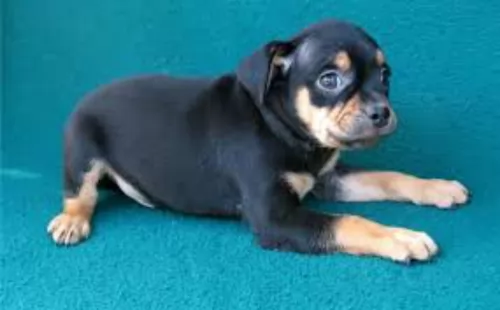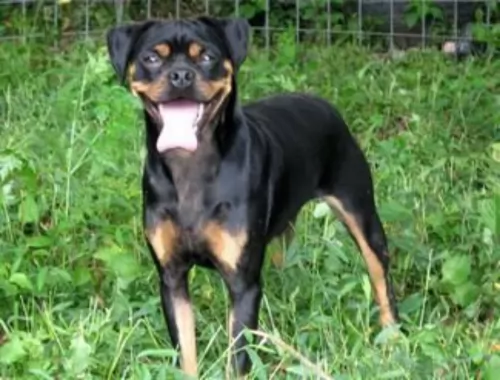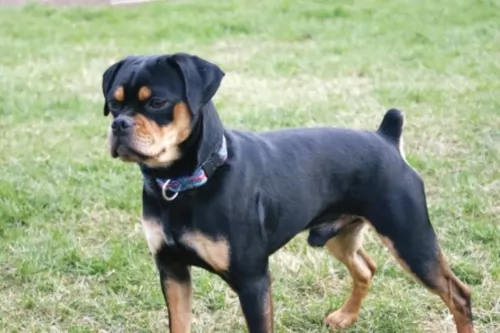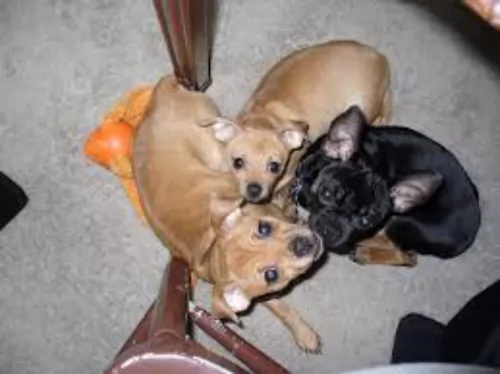 Petzlover
Petzlover Blue Healer is originated from Australia but Carlin Pinscher is originated from France. Blue Healer may grow 18 cm / 8 inches higher than Carlin Pinscher. Blue Healer may weigh 16 kg / 36 pounds more than Carlin Pinscher. Both Blue Healer and Carlin Pinscher has same life span. Blue Healer may have less litter size than Carlin Pinscher. Both Blue Healer and Carlin Pinscher requires Low Maintenance.
Blue Healer is originated from Australia but Carlin Pinscher is originated from France. Blue Healer may grow 18 cm / 8 inches higher than Carlin Pinscher. Blue Healer may weigh 16 kg / 36 pounds more than Carlin Pinscher. Both Blue Healer and Carlin Pinscher has same life span. Blue Healer may have less litter size than Carlin Pinscher. Both Blue Healer and Carlin Pinscher requires Low Maintenance.
 It was in 1802 that George Hall arrived in New South Wales, establishing 2 cattle stations. He had a problem – getting his thousands of cattle to the Sydney markets. He began looking at the prospect of a droving dog and imported a number of dogs of which a blue mottled dog emerged.
It was in 1802 that George Hall arrived in New South Wales, establishing 2 cattle stations. He had a problem – getting his thousands of cattle to the Sydney markets. He began looking at the prospect of a droving dog and imported a number of dogs of which a blue mottled dog emerged.
The dogs were crossed with dingoes and by 1840 the Halls Heelers were used by the Halls. However with the death of one of the Halls, their cattle stations went to action and the dogs, the Halls Heelers became available.
The dogs attracted attention, and the term ‘Australian Cattle Dog’ was adopted. The name referred to those dogs coming from Thomas Hall's ‘Heelers’. There have been many arguments about the origin of the breed, but the red or blue offspring known as Hall's Heelers were proven cattle drovers, and with further breeding experiments which included the Australian Kelpie, dingoes and the Dalmation, by 1893, the tough, robust working breed known as the Blue Heeler or the Australian Cattle Dog came about.
 There are conflicting views as to where the Carlin Pinscher hails from, with some reports saying France and others the USA. The names of some breeders suggest it could be France.
There are conflicting views as to where the Carlin Pinscher hails from, with some reports saying France and others the USA. The names of some breeders suggest it could be France.
The dog hasn’t got a long history, being developed only in the early 1900s. Two breeders, Morgan and Buenafe left their Miniature Pinscher with a Pug owner for a while and on return discovered that the dogs had mated, producing puppies which looked like miniature Rottweilers.
It was in 1998 that a breeding program began and a Boxer was also brought into the mix to improve the characteristics of the dog. The dog is still being developed and isn’t recognized by the major kennel clubs.
 Blue Heelers are medium-sized, sturdy, compact dogs who are somewhat longer than tall. The female Blue Heeler measures roughly 43–48cm at the withers, while the male measures about 46–51cm. If your Blue Heeler is in tip top condition, he’ll weigh about 15 to 22 kilograms. They are muscular with pointed, erect ears, dark eyes and long tails which are mostly hanging downwards. Their dense coats are blue- or red speckled and sometimes with tan markings.
Blue Heelers are medium-sized, sturdy, compact dogs who are somewhat longer than tall. The female Blue Heeler measures roughly 43–48cm at the withers, while the male measures about 46–51cm. If your Blue Heeler is in tip top condition, he’ll weigh about 15 to 22 kilograms. They are muscular with pointed, erect ears, dark eyes and long tails which are mostly hanging downwards. Their dense coats are blue- or red speckled and sometimes with tan markings.
The Blue Heeler is a ball of energy and he is clever too. You won’t find him sitting around for too long, and if there is sign of a walk or a ball game, he’s in! He is an independent dog, and although he makes a wonderful family pet, he tends to attach himself to that one special person in his life. He is a natural watchdog and protector of his human family.
 The Carlin Pinscher has been developed to be a social and loving companion. Started as a cross between a Miniature Pinscher and Pug, other breeds have also been brought in. He still has varied appearances, often looking like a tiny Rottweiler but also looking like anything between the Miniature Pinscher or the Pug.
The Carlin Pinscher has been developed to be a social and loving companion. Started as a cross between a Miniature Pinscher and Pug, other breeds have also been brought in. He still has varied appearances, often looking like a tiny Rottweiler but also looking like anything between the Miniature Pinscher or the Pug.
This is a small sized dog standing at anything from 27- to 33 cm and weighing 5 or 6kg. The body is compact with sturdy legs coming from the Pug side. The skull is a dome shape, the ears can be erect or floppy and unless the tail is docked it can be long, curling somewhat over the back. The coat is short and smooth and comes in shades of tan, brown and black.
The Carlin Pinscher is small but with a strong personality, being gentle and sweet in nature. He promises to be a loyal and affectionate companion for his human family, loving to be involved in all their activities.
He is an energetic, playful little dog and also intelligent, so apart from a walk and ball games, he’ll need some toys for indoors too that can provide physical- and mental stimulation. With early training and socialization, the Carlin Pinscher is a good friend of children and he will get on well with other pets in the house too. He is a small dog so children should be supervised and taught to handle him with gentleness and kindness.
 Training and socializing of your Blue Heeler will ensure that your dog does what you want him to. The Blue Heeler is an intelligent, responsive dog and training can benefit him, turning him into an outstanding family pet, good with children and other pets in the home.
Training and socializing of your Blue Heeler will ensure that your dog does what you want him to. The Blue Heeler is an intelligent, responsive dog and training can benefit him, turning him into an outstanding family pet, good with children and other pets in the home.
He is a playful, affectionate pet who doesn’t take easily to strangers, and this is what makes him such an excellent guard dog.
Your Blue Heeler is not an apartment dog as he requires a lot of exercise, and cooping him indoors for too long with nothing to do can lead to destructive behavior.
Head-strong, independent and robust, your Blue Heeler will need a firm owner who is boss. Add to the firm owner a lot of love and care, and you’ll have a devoted friend.
 The Carlin Pinscher makes an ideal little pet and he will be content to live in a small home in the city or in the country, just so long as he is with an owner who loves and cares for him. They are balanced, easy-to-get-along-with dogs, being even-tempered, playful and outgoing.
The Carlin Pinscher makes an ideal little pet and he will be content to live in a small home in the city or in the country, just so long as he is with an owner who loves and cares for him. They are balanced, easy-to-get-along-with dogs, being even-tempered, playful and outgoing.
He is active, intelligent, strong-willed, stubborn and brave. It is true that people who have kept mixed-breed dogs rave about them. Certainly mixed breed dogs have earned themselves a reputation for being superb family pets. They’re healthy, feisty, quaint and entertaining.
These days many mixed breeds are no longer pavement specials but part of careful breeding, such as with the Carlin Pinscher. He is full of personality and makes a great family pet, getting along with other animals and also being good around children.
 Australian cattle dogs are healthy and can live up to 15 years of age, but even so there are some genetic conditions that you will need to be aware of following
Australian cattle dogs are healthy and can live up to 15 years of age, but even so there are some genetic conditions that you will need to be aware of following
Eye issues which includes progressive retinal atrophy – this disease is an inherited disease of the retina of the eye where the rod cells are destined to die. Fortunately it is not painful for the dog. There are different types of inherited retinal degenerative diseases in dogs but going into detail with them is beyond the scope of this article. For more information you can chat to your vet.
Recessive piebald elleles - the Blue Heeler has recessive piebald alleles which can produce white in the skin and coat and which is linked to congenital hereditary deafness.
 The Carlin Pinscher is a feisty little dog who can live to be up to 13, 14 or 15 years of age. He is a fairly healthy breed too, but there will always be some issues that the Carlin Pinscher might be prone to. Typical dog ailments include eye problems, hip dysplasia, liver problems, skin- and dental problems.
The Carlin Pinscher is a feisty little dog who can live to be up to 13, 14 or 15 years of age. He is a fairly healthy breed too, but there will always be some issues that the Carlin Pinscher might be prone to. Typical dog ailments include eye problems, hip dysplasia, liver problems, skin- and dental problems.
All liver problems with a dog are serious and will need veterinary intervention. A noticeable symptom of liver disease is jaundiced yellowing of the white of the eye. You might even see a yellowing on the underside of the ear flap. Your pet will have loss of appetite, constipation as well as highly colored urine.
 Remember that your Blue Heeler was once a full time cattle dog where he used to become totally and utterly exhausted from herding cattle. This is what he loved – the activity. If you have a Blue Heeler, you will need to provide him with plenty of exercise.
Remember that your Blue Heeler was once a full time cattle dog where he used to become totally and utterly exhausted from herding cattle. This is what he loved – the activity. If you have a Blue Heeler, you will need to provide him with plenty of exercise.
If you live on a farm, your Blue Heeler will be in his element because he can run, walk and swim to his heart’s content. If you keep your Blue Heeler in your back garden, you will need to provide him with ball games, rope games, long walks, running on a leash as you cycle and other activities.
Your Blue Heeler has a short, weather-resistant double coat. He’s not a heavy shedder, but he will have his share of seasonal shedding, so it’s a good idea to get into the habit of brushing him at least twice a week. This will get rid of all those loose hairs and keep his skin healthy by getting the blood flowing and distributing his natural oils.
Giving the best dog food for your Blue Heeler will come from either your home made food or a top quality commercially manufactured dog food. He is such a high energy dog, that your veterinarian can advise you on a dog food specially designed for high energy breeds.
These foods are well balanced and are enriched with amino acids and vitamins, promoting healthy bones and joints. Remember to include some raw meat into your dog’s diet and to ensure a constant source of cool, fresh water.
Ensure your Blue Heeler’s ongoing health by paying attention to ears, nails and teeth.
 With his short, smooth coat, the Carlin Pinscher is a low to moderate shedder who is easy to maintain. The short coat will simply need a brush-down twice a week to rid him of loose hairs. If he is dusty, you can wipe the coat down with a warm, damp cloth.
With his short, smooth coat, the Carlin Pinscher is a low to moderate shedder who is easy to maintain. The short coat will simply need a brush-down twice a week to rid him of loose hairs. If he is dusty, you can wipe the coat down with a warm, damp cloth.
Every dog, large or small needs a balanced diet that consists of proteins, fats, vitamins, minerals and carbohydrates. A well balanced diet keeps a dog healthy but also in shape. A dog requires certain ingredients in its diet, depending on age, activity levels, size and stage of life such as pregnancy or illness.
For starters, dogs need fresh, cool water at all times. If you’re confused about dry kibble or semi-moist dog food for instance, speak to your vet about what your Carlin Pinscher needs. It’s always good to give your pet variety, so mixing in some rice, vegetables and meat will be wonderful for your pet as will some raw meat from time to time.